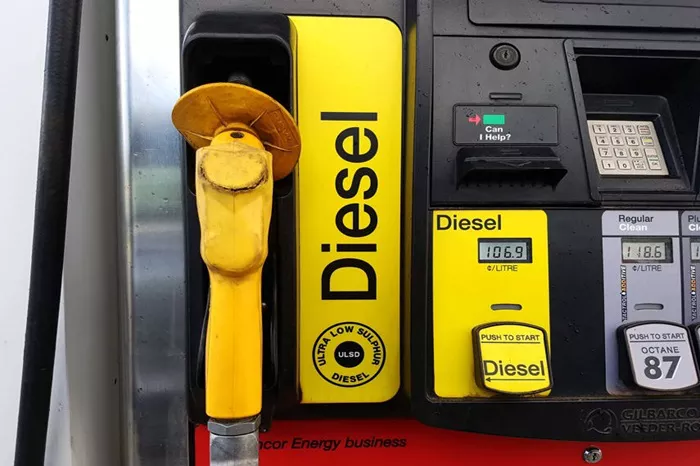Diesel fuel is a crucial component of the global energy landscape. It powers a wide range of applications, from transportation and agriculture to industrial machinery and power generation. While gasoline is also a vital fuel, diesel is often more abundant. This article delves into the top five reasons why diesel is more abundant than gasoline, highlighting the factors that contribute to its widespread availability and usage.
Introduction
Diesel and gasoline are both derived from crude oil and play significant roles in powering various sectors of the economy. Despite their similarities, diesel is often more prevalent and widely used than gasoline. Understanding the reasons behind this can provide insights into the dynamics of fuel production and consumption.
Reason 1: Efficiency in Production
One of the primary reasons for diesel’s abundance is its efficiency in the refining process. Crude oil refining is a complex process that involves separating various hydrocarbons into different products. Diesel fuel is more straightforward to produce compared to gasoline.
Refining Diesel
Less Complex Refining: Diesel is produced through a simpler refining process. This means that a larger proportion of crude oil can be converted into diesel fuel.
Higher Yield: The yield of diesel from a barrel of crude oil is typically higher than that of gasoline. This makes diesel a more abundant product in the refining process.
Refining Gasoline
More Complex Refining: Gasoline requires a more complex refining process, including additional steps such as catalytic cracking and reforming. These processes increase the cost and complexity of gasoline production.
Lower Yield: The yield of gasoline from a barrel of crude oil is generally lower than that of diesel, making gasoline less abundant.
Reason 2: Diesel’s Versatility
Diesel’s versatility is another factor contributing to its abundance. Diesel fuel is used in a wide variety of applications, making it a more versatile and widely demanded fuel.
Transportation
Commercial Vehicles: Diesel powers a significant portion of the world’s commercial vehicles, including trucks, buses, and trains. These vehicles are essential for transporting goods and people, creating a steady demand for diesel.
Marine and Aviation: Diesel is also used in marine and aviation applications, particularly in large ships and aircraft that require high energy density and efficiency.
Agriculture and Industry
Agricultural Equipment: Diesel is the fuel of choice for many types of agricultural equipment, such as tractors, combines, and irrigation pumps. This ensures a constant demand for diesel in the agricultural sector.
Industrial Machinery: Many industrial machines, including generators, construction equipment, and mining machinery, rely on diesel. This widespread use in industry further boosts diesel’s prevalence.
See also: What Type Of Plastic Can Withstand Gasoline?
Reason 3: Energy Density
Diesel fuel has a higher energy density compared to gasoline. This means that diesel contains more energy per unit of volume, making it a more efficient fuel for many applications.
Efficiency in Use
Greater Fuel Efficiency: Diesel engines are typically more fuel-efficient than gasoline engines. They extract more energy from each gallon of fuel, resulting in better fuel economy.
Longer Range: Vehicles powered by diesel can travel longer distances on a single tank of fuel compared to those powered by gasoline. This makes diesel a preferred choice for long-haul transportation and heavy-duty applications.
Environmental Impact
Lower CO2 Emissions: Because diesel engines are more efficient, they tend to produce lower CO2 emissions per mile compared to gasoline engines. This can be advantageous in meeting environmental regulations and reducing the carbon footprint.
Reason 4: Storage and Stability
Diesel fuel has superior storage and stability characteristics compared to gasoline. This makes it a more practical choice for applications requiring long-term fuel storage.
Stability
Less Volatile: Diesel is less volatile than gasoline, reducing the risk of evaporation and fuel loss during storage. This makes diesel easier to store and handle, especially in large quantities.
Longer Shelf Life: Diesel has a longer shelf life compared to gasoline. It can be stored for extended periods without significant degradation, making it ideal for backup power systems and emergency supplies.
Storage
Easier Storage: The lower volatility of diesel also means that it can be stored in simpler and less expensive tanks and containers. This reduces the overall cost and complexity of fuel storage.
Reason 5: Infrastructure and Distribution
The infrastructure and distribution networks for diesel are well-established and efficient, contributing to its abundance and availability.
Production Facilities
Refineries: Many refineries are optimized for diesel production, ensuring a steady supply of this fuel. The high yield and simpler refining process make diesel a reliable product for refineries to produce.
Bio-Diesel Production: The growing production of bio-diesel, which can be blended with conventional diesel, further boosts the supply of diesel fuel. Bio-diesel is produced from renewable sources, adding to the overall diesel supply.
Distribution Network
Transport Infrastructure: The transport infrastructure for diesel, including pipelines, railways, and shipping routes, is well-developed. This ensures efficient distribution from refineries to end-users.
Retail Availability: Diesel is widely available at fuel stations around the world, making it easily accessible for consumers and commercial users alike.
Conclusion
Diesel’s abundance compared to gasoline can be attributed to several factors, including its efficient production process, wide range of applications, higher energy density, superior storage stability, and well-established infrastructure. These characteristics make diesel a versatile and reliable fuel that meets the needs of various sectors, from transportation and agriculture to industry and power generation.
By understanding these reasons, consumers and businesses can make informed decisions about their fuel choices and better appreciate the role of diesel in the global energy landscape.
Related topics:
Diesel Fuel HVO100 Prices Lower Than Expected

